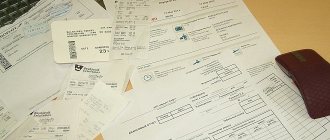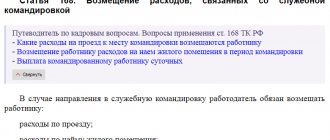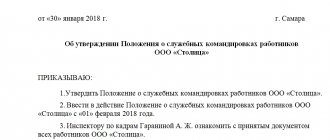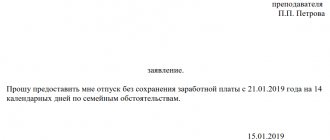What is a one-day business trip
A one-day business trip assumes that, to carry out a work assignment, an employee is sent to an area from where he can return daily to his place of permanent residence (clause 11 of the Regulations on Business Travel, approved by Decree of the Government of the Russian Federation of October 13, 2008 No. 749).
Whether an employee can return home or not is decided by the head of the company. In doing so, he must take into account:
- how great is the distance from the workplace to the place of business travel;
- the nature of the work performed by the employee at the place of business trip;
- the time an employee needs for proper rest after a business trip.
One-day business trip: reimbursement of expenses, personal income tax and insurance premiums
One-day business trip: reimbursement of expenses, personal income tax and insurance premiums
In accordance with Article 166 of the Labor Code of the Russian Federation (Labor Code of the Russian Federation), a business trip is recognized as a trip by an employee by order of the company for a certain period of time to carry out an official assignment outside the place of permanent work.
When an employee is sent on a business trip, by virtue of Article 167 of the Labor Code of the Russian Federation, his place of work (position) and average earnings are retained, and expenses associated with the trip are reimbursed (Article 168 of the Labor Code of the Russian Federation), including:
– travel expenses;
– expenses for renting residential premises;
– additional expenses associated with living outside the place of permanent residence (per diem);
– other expenses incurred by the employee with the permission or knowledge of the employer (telephone conversations, payment for taxi services, expenses related to currency exchange, etc.).
This list of expenses is open and determined by a collective agreement or local regulations (order of the manager / regulations on business trips).
The duration of the business trip is determined by the employer. It depends on the volume, complexity and other features of the official assignment (paragraph 1 of clause 4 of the Regulations on the peculiarities of sending employees on business trips, approved by Decree of the Government of the Russian Federation of October 13, 2008 No. 749 (hereinafter referred to as the Regulations)).
A business trip can be either one-day or long. At the same time, it cannot be unlimited, since according to Art. 166 of the Labor Code of the Russian Federation, a business trip is considered a business trip for a certain period established for the employee to carry out a specific official assignment. The maximum duration of a business trip is not established by law.
In accordance with the above-mentioned Article 168 of the Labor Code of the Russian Federation, the employee is reimbursed for additional expenses associated with living outside his place of permanent residence, namely, daily allowances. Daily allowances are paid for each calendar day of travel.
The case of sending an employee on a business trip for one day and returning from it on the same day has its own characteristics.
Let us recall that in 2005, the norm of paragraph 15 of the Instructions of the Ministry of Finance of the USSR, the State Committee for Labor of the USSR and the All-Union Central Council of Trade Unions dated 04/07/1988. No. 62 “On official business trips within the USSR” (hereinafter referred to as Instruction No. 62), according to which, when traveling to an area where the business traveler has the opportunity to return daily to his place of permanent residence, daily allowances (allowances in lieu of daily allowances) are not paid , became the subject of consideration in the Supreme Court of the Russian Federation (hereinafter referred to as the Supreme Court of the Russian Federation). By decision of the Supreme Court of the Russian Federation of March 4, 2005 No. GKPI05_147, the application to invalidate the first sentence of paragraph 15 of Instruction No. 62 “On official business trips within the USSR” was left unsatisfied. At the same time, the highest judicial body cited the following arguments to substantiate its position.
From the content of Articles 167, 168 of the Labor Code of the Russian Federation, it follows that daily allowances are intended to cover the employee’s personal expenses for the period of a business trip, since the employee’s average earnings for the duration of the business trip are maintained, the employee’s travel to the place of business trip and back to the place of permanent work is paid, and hiring expenses are reimbursed living space. The legislator made the payment of daily allowance to an employee conditional on the employee's residence outside his place of permanent residence for more than 24 hours . There are 24 hours in a day, this circumstance is generally recognized and does not require proof by virtue of Article 61 of the Civil Procedure Code of the Russian Federation.
The situation did not change after the introduction on October 28, 2008 of the Regulations on the specifics of sending employees on business trips, approved by Decree of the Government of the Russian Federation dated October 13, 2008 No. 749 in accordance with Article 166 of the Labor Code of the Russian Federation. This regulatory document does not oblige the company to pay daily allowance if the employee returns home on the same day he was sent on a business trip (clause 11 of the Regulations).
According to paragraph 11 of the Regulations, the payment of daily allowances is mandatory, except in cases where the employee has the opportunity to return home every day, and such a decision is made by the manager in each individual case. The following are taken into account:
— distance to the place of business trip and transport conditions;
— the nature of the task being performed;
— the possibility of creating conditions for the employee to rest.
However, if the employee, at the end of the working day, in agreement with the head of the organization, remains at the place of business trip, then he should be reimbursed for living expenses. Previously, paragraph 15 of Instruction No. 62 stated that in this situation the employee can remain at the place of business trip at his own discretion, but now he needs to coordinate this with the manager (this only applies to business trips in Russia).
For one-day foreign business trips, in accordance with paragraph 20 of the Regulations, daily allowances in foreign currency are paid in the amount of 50% of the standard established by the organization for the payment of daily allowances for foreign business trips.
When calculating income tax, you should pay attention to daily allowance payments for one-day business trips.
According to subparagraph 12 of paragraph 1 of Article 264 of the Tax Code of the Russian Federation (hereinafter referred to as the Tax Code of the Russian Federation), other expenses associated with production and sales include business travel expenses, including daily allowances.
As stated earlier, when traveling on business to an area from where the employee can return daily to his place of permanent residence, daily allowances are not paid (clause 11 of the Regulations). The Arbitration Court of the Ural District, in its resolution dated January 30, 2015 No. F09-9855/14 in case No. A60-15139/2014, accepted the position of the tax authorities regarding the illegality of including “one-day” daily allowances as expenses for profit tax purposes.
However, there is a way out. In a collective agreement or local regulation for one-day business trips, it is possible to provide for reimbursement to employees of costs associated with such a trip, defining the cases, procedure and amount of compensation in accordance with paragraph 24 of the Regulations. And, thus, if there is documentary evidence, these expenses can be taken into account in accordance with subparagraph 49 of paragraph 1 of Article 264 of the Tax Code of the Russian Federation. The Ministry of Finance of Russia also agrees with this (for example, Letters dated May 26, 2014 No. 03-03-06/1/24916, dated August 1, 2013 No. 03-03-06/1/30805).
As for the travel certificate, you do not need to issue it for a one-day business trip. Such an obligation is not expressly provided for by law. According to Instruction No. 62, a travel certificate may not be issued if the employee must return from a trip on the same day.
Let us remind you that this Instruction is allowed to be used, since by virtue of Article 423 of the Labor Code of the Russian Federation, until the regulatory legal acts in force on the territory of the Russian Federation are brought into accordance with the Labor Code of the Russian Federation, legal acts of the USSR can be applied.
The Russian Ministry of Labor in its letter dated February 14, 2013. No. 14-2-291 also indicated that it is permissible not to issue a travel certificate to confirm expenses when sending an employee on a one-day business trip.
Personal income tax on reimbursement of expenses for a one-day business trip
As noted earlier, an employee may be reimbursed for any expenses associated with a business trip if they were made with the permission of the manager or provided for by local regulations (Articles 167, 168 of the Labor Code of the Russian Federation).
All types of compensation established by current legislation related to the performance by an employee of his or her job duties are not subject to personal income tax. This rule also applies to reimbursement of travel expenses, including the payment of daily allowances.
However, daily allowances are not exempt from personal income tax in full, but within the limit established by paragraph 3 of Article 217 of the Tax Code of the Russian Federation: no more than 700 rubles. for each day of a business trip in the Russian Federation and no more than 2.5 thousand rubles. for each day you are on a business trip abroad.
The money that is paid to employees when they are sent on a business trip for one day, although not considered daily allowance under labor law, nevertheless represents reimbursement of expenses associated with the need to perform labor functions outside the place of permanent work.
Therefore, such payments cannot be recognized as income or economic benefit of the employee, and therefore should not be subject to personal income tax. This is precisely the conclusion made by the Presidium of the Supreme Arbitration Court of the Russian Federation in its resolution dated September 11, 2012 No. 4357/12.
It is worth noting that before the adoption of this resolution, the Russian Ministry of Finance believed that since payments for one day of a business trip do not correspond to the concept of daily allowance, they should be subject to personal income tax (letter dated 09/04/09 No. 03-04-06-01/230).
Arbitration practice on this issue has been mixed. Some arbitrators supported the tax authorities (resolutions of the Federal Arbitration Courts (hereinafter referred to as FAS) of the Volga District No. A65-5696/06 dated March 16, 2007, Volgo-Vyatsky District No. A82-6004/2004-27 dated October 31, 2006), others were on the side companies (resolutions of the Moscow FAS dated 04/03/12 No. A40-73890/11-91-314, West Siberian districts No. A70-10656/2010 dated 09/02/11).
The Russian Ministry of Finance agreed with the opinion of the Supreme Arbitration Court of the Russian Federation and allowed to consider daily allowances for one-day business trips as other compensation provided for by law and, accordingly, not to withhold personal income tax from such payments (Letter of the Russian Ministry of Finance dated March 01, 2013 No. 03-04-07/6189).
However, there is still a small caveat.
The Russian Ministry of Finance indicated that such payments should be standardized by analogy with daily allowances (exempt from taxation within the range of 700 rubles when on a business trip in the Russian Federation and 2.5 thousand rubles when on a business trip abroad).
Insurance premiums
Part 1 of Article 7 of the Federal Law of the Russian Federation dated July 24, 2009 N 212-FZ “On insurance contributions to the Pension Fund of the Russian Federation, the Social Insurance Fund of the Russian Federation, the Federal Compulsory Medical Insurance Fund and territorial compulsory medical insurance funds” (hereinafter referred to as the Federal Law N 212-FZ) it is determined that the object of taxation of insurance premiums for organizations is payments and other remuneration accrued in favor of individuals, in particular, under employment contracts and civil contracts, the subject of which is the performance of work or the provision of services.
According to Part 1 of Article 8 of Federal Law N 212-FZ, the base for calculating insurance premiums for payers-organizations is defined as the amount of payments and other remunerations provided for in Part 1 of Article 7 of Federal Law N 212-FZ, accrued by payers of insurance premiums for the billing period in favor of individuals persons, with the exception of the amounts specified in Article 9 of Federal Law N 212-FZ.
At the same time, the occurrence of an object of taxation with insurance premiums does not depend on the inclusion (or non-inclusion) of payments in favor of employees in income tax expenses.
In accordance with Part 2 of Article 9 of Federal Law N 212-FZ, when an organization pays expenses for business trips of employees both within the territory of the Russian Federation and outside the territory of the Russian Federation, they are not subject to insurance contributions, in particular:
- daily allowance;
- targeted expenses, including expenses:
- renting accommodation;
- for travel to and from your destination, as well as for baggage transportation, this also includes station and airport fees and various types of commissions;
— to pay for the services of communication institutions;
— for obtaining a service passport and visas;
— to receive foreign currency or issue a bank check for foreign currency.
The list of expenses, payment of which is not subject to insurance premiums, established by Article 9 of Federal Law N 212-FZ, is exhaustive , and payment, including expenses not listed in Article 9 of Federal Law N 212-FZ, is subject to insurance premiums in the generally established manner as payments made in favor of employees within the framework of labor relations.
In addition, insurance premiums are not charged provided that these expenses are documented. From January 1, 2015, this is directly provided for in the law, and before this date it followed from the explanations of officials (see letter of the Ministry of Health and Social Development of Russia dated May 26, 2010 No. 1343-19).
As for the payment of daily allowances for one-day business trips, they do not need to be subject to insurance premiums, nor do they need to be included in the RSV-1 for the Pension Fund of the Russian Federation (see Determination of the RF Armed Forces dated January 26, 2015 No. 310-KG14-7400).
Separately, it is necessary to say about the amounts of average earnings that the employer, according to Art. 167 of the Labor Code of the Russian Federation, accrues to its employee while he is on a business trip. These funds are subject to insurance premiums, and this is done in accordance with the general procedure.
In addition, additional payments are practiced, with the help of which the employer equalizes the amount of average earnings with the actual one. Such payments in accordance with paragraph 5 of part 2 of article 57 and part 2 of article 41 of the Labor Code of the Russian Federation must be stipulated in a collective agreement or other local regulatory act. However, these amounts are also necessarily subject to insurance premiums.
In case of cancellation (postponement) of a business trip, expenses incurred in connection with preparations for departure (for example, visa costs) are also not subject to insurance premiums. Thus, the Ministry of Labor of Russia in letter dated November 27, 2014 No. 17-3/B-572 and the Social Insurance Fund (SIF) of the Russian Federation in paragraph 2 of the Appendix to the letter of the FSS of the Russian Federation dated April 14, 2015 No. 02-09-11/06-5250 led to The following arguments support this statement:
- Insurance premiums, in accordance with Part 2 of Article 9 of Federal Law No. 212-FZ of July 24, 2009, are not charged on fees paid for issuing and receiving visas. The authors of the letters note that this category of expenses should also include payment for medical insurance, which is an integral part of each visa.
- When a business trip is cancelled, these expenses do not lose their essence, so such payments do not need to be subject to insurance premiums.
Arranging for a one-day business trip
An organization can establish the procedure for sending employees on business trips by local regulations, for example, the Regulations on Business Travel (clause 4 of Article 168 of the Labor Code of the Russian Federation).
If there is no local act or it does not stipulate such a procedure, then the general rules established by the Regulations on Business Travel apply.
There are no differences from multi-day business trips when booking a business trip for one day.
First of all, the company must issue an order or instruction to send the employee on a business trip. It determines the place, duration and purpose of the business trip.
Secondly, give the employee an advance to pay for travel expenses (clause 10 of the Business Travel Regulations). Advance can be:
- give the employee “cash” from the organization’s cash desk;
- transfer as a sub-account to his bank card.
Methods for issuing an advance must be fixed in the Regulations on Business Travel or another local act of the company.
Advance to posted employee
Read more…
Finally, if the Regulations on Business Travel provide for the maintenance of a business trip journal, then you will have to make entries in them about arriving and departing seconded workers.
Business trip for one day: how is it paid?
Regardless of the duration of the official trip, the employee retains his workplace and position. The employer must also pay him his average salary. Therefore, with a one-day payment:
- One average daily earnings if the UK falls on a working day.
- If the IC falls on a holiday or day off, then make the payment in accordance with the current labor legislation, that is, the average daily earnings in an increased amount. Read more in the material “How to properly pay for business trips on a day off.”
In addition to the average salary, pay the employee for all expenses that are documented. For example, payment for travel confirmed by tickets. Also reimburse expenses that the employee made with the permission of the employer.
The institution sets its own limits for paying travel expenses. Moreover, such indicators should be enshrined in a separate local order of the organization’s management.
Travel expenses for a one-day business trip
When reimbursing expenses for a one-day business trip, the same rules and guarantees apply as for multi-day trips (Articles 167, 168 of the Labor Code of the Russian Federation). But with some peculiarities.
Thus, travel expenses for a posted worker will always be reimbursed. Of course, if he provides travel documents. The same rule applies to reimbursement of other expenses incurred with the permission of the employer.
Expenses for renting accommodation will be reimbursed only when the employee remains at the place of business trip at the end of the working day. Such an “overnight stay” must be agreed upon with the head of the organization. And, of course, it is confirmed by relevant documents - invoices and cash receipts from the hotel, agreements with property owners, etc.
As for daily allowances, they are not paid when traveling for one day in Russia. There is a direct indication of this in the Regulations on Business Travel (paragraph 4, clause 11 of the Regulations). But if they are nevertheless issued to the employee, then the entire amount is included in his total income and is subject to personal income tax.
How are daily allowances rationed?
Read more…
But if we are talking about a one-day business trip abroad, then you can count on daily allowances. They are paid in the amount of 50% of the standard cost of daily allowance for business trips abroad. These norms are determined by the local regulatory act on business trips (clause 20 of the Regulations on business trips, article 168 of the Labor Code of the Russian Federation).
Daily allowance for one day of business trip
If the business trip is only for one day, how is it paid? There are short-distance business trips in which the employee has every opportunity to return home every day - and if he does this, then per diem should not be paid. However, for a one-time trip lasting a day (that is, at least 24 hours), daily allowance must be paid, as well as payment of expenses.
Accountants are often concerned about whether it is necessary to collect personal income tax from the daily allowance for a business trip that lasted only a day? And here it is impossible to give a definite answer. On the one hand, there are known court decisions on the payment of personal income tax for such business trips, since daily allowances were recognized as a source of income from which, accordingly, an individual must pay this tax. On the other hand, directly opposite decisions were made, and the demands of the tax inspectorate were recognized as unlawful. In short, there is no complete certainty on this issue.
The issue of insurance premiums based on the daily allowance is also interesting.
Do I need to accrue them for a one-day work trip? No, there is no such need, they are not paid within the limits established by the Tax Code (up to 700 rubles for business trips within the country, up to 2,500 rubles for trips abroad).
What determines the duration of a business trip?
The period for which an employee is sent on a business trip depends on the composition, volume and complexity of the work performed by him during the trip (clause 4 of the Regulations to the Decree of the Government of the Russian Federation of October 13, 2008 No. 749).
Since all the parameters characterizing the work to be performed on a business trip are set by the employer, he also sets the duration of the business trip, taking into account the time required to arrive at the place of business trip and return from it. The time spent on the road is included in the duration of the business trip, and its entire duration is counted from the day of departure to the day of return.
Moreover, these days are not always determined by travel documents - if the place of departure of the corresponding transport is remote from the populated area that is the place of departure, the additional time required to get to the station, pier or airport and from them back to the point of departure is taken into account .
The maximum duration of a business trip is not legally limited, but for each trip it is necessary to set a specific duration, since the period for a business trip is one of its mandatory characteristics (Article 166 of the Labor Code of the Russian Federation). And the minimum possible duration of a business trip is 1 day. On this single day allotted for a business trip, the employee must get to the place of business trip, complete a work assignment and return back.









